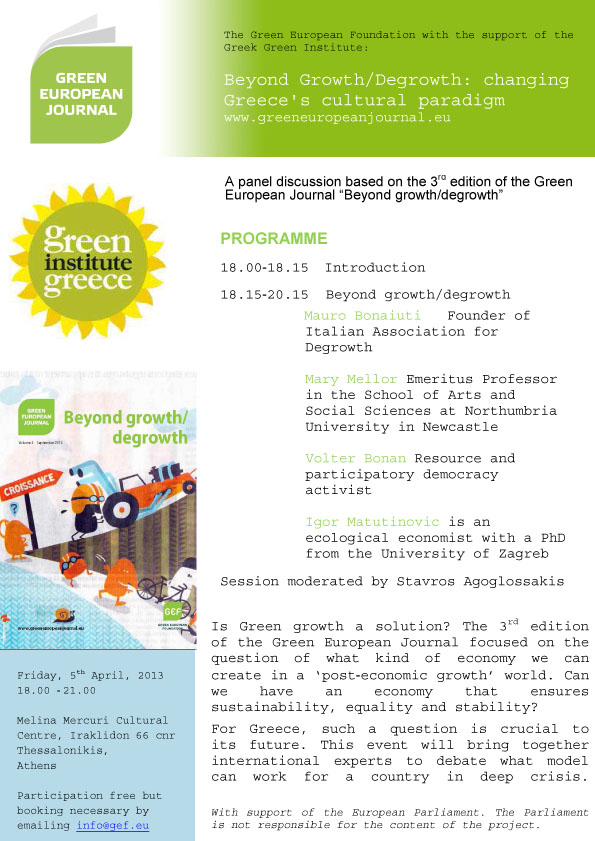Is Green growth a solution? Can we have an economy that ensures sustainability, equality and stability? The 3rd edition of the Green European Journal: beyond growth/degrowth focused on the question of the kind of economy we can create in a ‘post-economic growth’ world. Taking Greece as an example, in these turbulent times of crisis, and the relevance of the above crucial question for its future, Greek Green Institute and Green European Foundation organised an event on the issues of Growth and Degrowth. This event, bearing the title ‘Beyond Growth/Degrowth: changing Greece’s cultural paradigm’ took place on the 5h of April 2013 in Athens and aimed at bringing together international experts to debate on the kind of model that could work for a country in deep crisis.
The event started with a welcome speech by the president of Greek Green Institute, Kostas Loukeris, and the vice-president, Stavros Agoglossakis, who was moderating of the discussion. Stavros Agoglossakis presented the context of the session, putting emphasis on the rising importance of Degrowth for countries like Greece, and gave the floor to the four speakers participating in the event: Mauro Bonauiti (Founder of the Italian Association for Degrowth), Mary Mellor (Emeritus Professor in the School of Arts and Social Sciences at Northumbria University in Newcastle), Valter Bonan (Resource and participatory democracy activist) and Igor Matutinovic (Ecological Economist with a PhD from the University of Zagreb) to start with their presentations.
Mauro Bonauiti opened the session by explaining the origins of Degrowth from the two streams of thought of Bioeconomis and Criticism of development that both shared the critism of sustainable development and ‘economical imaginary’. He talked about the issue of scale on growth, representing a critical threshold which, when exceeded, leads to complexity and declining marginal returns for the economy, including social benefits and everyday life, energy efficiency, etc. Taking into consideration the negative externalities and declining benefits of growth, he foresaw four political scenarios (Collapse, new Expansion Circle, Fortress and Resilience). The last one, dealing with the notions of resilience and Degrowth society, is based on a voluntary simplification of the economy which preserves the planet’s natural resources. He concluded that the ecological limits cannot be separated from those of society and its institutions, and that Degrowth is not an alternative per se but an array of alternatives without dogmas. Mauro Bonauiti Presentation in PDF format.
Mary Mellor spoke about the idea of value of money in relation to Degrowth. She explained how the value of money was misplaced, leading to a huge increase in public debt. Using the example of ‘handbag economics’ ideology, she compared states to households which after the mid-70s depend on external sources for money, as they are forced to borrow from the financial sector in order to increase their expenditure. She highlighted the importance and the need for a transition to an economy of efficiency and Degrowth, based on the principles of social justice and ecological sustainability. In order to change the current economic model and its dynamics from a market economy to a real economy, she suggested a shift within the financial system by democratising money for the public, people and sustainability. She talked about the history and value of money in the past and explained how in recent decades money supply was ‘privatised’ by the financial system and the markets. She finally argued that the control of money supply needs to be taken back from the banks and all new money should be issued free of debt on the basis of democratic priorities, while private investment should be based on a real transfer of money. Mary Mellor Presentation in PDF format.
The third panellist, Valter Bonan, discussed the high importance of locality and local networking for achieving Degrowth. Using examples from actions and initiatives from the Italian context against privatization of water, devastation of rural areas, intensive crops and farming, big infrastructure projects etc., he highlighted the great role and impact of organizing local initiatives and solidarity groups by citizens while being engaged in a participatory decision making processes. Bonan, finally, pointed out how important it is to interface small and big networks for the creation of a “Bio-regional Europe”, where local contexts play a leading role and how the notion of reciprocity and solidarity become the main priorities for the transition to Degrowth economy.
Last but not least, Igor Matutinovic discussed the myth of unbounded economy and described the latter as messianism as there isn’t any particular cause or movement destined to triumph or save the world. He started by mentioning some common problems faced by both Croatia and Greece, such as huge unemployment and public debt, lack of competiveness and disinvestments, low social indicators and environmental problems. After presenting the problems and the local/global conditions, he said that these problems are many, systemic, and global, while there is an interaction of the three complex systems of economy, society and environment. He argued that transition from a growth economy to a steady state economy is not easy, as an entire shift in institutions and our beliefs system is necessary, and that can take a long time. Matutinovic talked about unpredictability, insufficiency and insecurity when dealing with societies and ecosystems, and suggested moderate and careful action. He finally emphasized the role of local actions (citizens, NGOs etc.) and their great impact on the progress of the system. Igor Matutinovic Presentation in PDF format.
The presentations by the four panelists were followed by questions from the audience, leading to a very interesting and fruitful open discussion on Growth/Degrowth topics.

